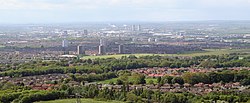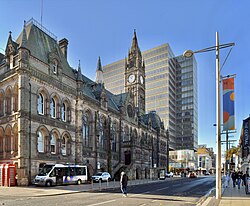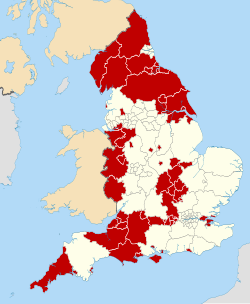Borough of Middlesbrough
 From Wikipedia - Reading time: 14 min
From Wikipedia - Reading time: 14 min
The Borough of Middlesbrough is a district in the ceremonial county of North Yorkshire, England. It is part of the Tees Valley region, along with the boroughs of Stockton-on-Tees, Redcar and Cleveland, Hartlepool and Darlington. The district covers the town of Middlesbrough, Nunthorpe civil parish and Stainton and Thornton civil parish. Since its creation in 1974, it has had borough status and the governing Middlesbrough Council became a unitary authority in 1996.
History
[edit]The borough was preceded by the County Borough of Teesside in the North Riding of Yorkshire, having previously been an independent municipal borough from 1856 to 1968. The current borough boundaries were formed on 1 April 1974, by the creation of a new non-metropolitan district of the new county of Cleveland by the Local Government Act 1972, covering the previous borough of Middlesbrough along with nearly all of Middlesbrough Rural District. It was reconstituted as a unitary authority, alongside the abolition of Cleveland, on 1 April 1997. For ceremonial purposes it is part of North Yorkshire, though certain local services are still aligned to 1974 boundaries, including Cleveland Fire Brigade and Police. It is included within the Tees Valley combined authority area for devolved transport and economic governance.
| County | Borough/ district | |||||
|---|---|---|---|---|---|---|
| Name | Type | Dependent | Type | From | Until | Notes |
| Yorkshire | Historic | Municipal borough | 1856 | 1889 | ||
| North Riding of Yorkshire | Administrative | County borough | 1889 | 1974 | Merged into Teesside CB in 1968 | |
| Cleveland (county town) | Non-metropolitan | Non-metropolitan district | 1974 | 1996 | ||
| North Yorkshire | Ceremonial | Unitary authority | 1996 | |||
Areas of the borough
[edit]The borough contains the following areas:
Structure
[edit]The borough is made up of 19 council wards (formerly 21 as Gresham ward merged with Newport ward between the 2011 and 2021 censuses) within the borough of Middlesbrough. Each ward has a non-statutory community committee.[5] There are also two statutory parish councils for "Nunthorpe" and "Stainton and Thornton".[6] East, north and west Middlesbrough as well as parts of Park End-and-Beckfield, Berwick-Hils-and-Pallister and Ladgate are covered by the Middlesbrough parliamentary constituency. South Middlesbrough as well as the other parts of the wards are covered by the Middlesbrough South and East Cleveland parliamentary constituency.

| |||||||||||||||||||||||||||||||||||||||||||
The council operates a with directly elected Mayor of Middlesbrough. The political composition of the council, as of the May 2019 local election, is Independent 23, Labour 20; and Conservative 3.
| Party | Seats[7][8] | Current council | |||||||||||||||||||||||||||||||||||
|---|---|---|---|---|---|---|---|---|---|---|---|---|---|---|---|---|---|---|---|---|---|---|---|---|---|---|---|---|---|---|---|---|---|---|---|---|---|
| Independent | 23 | ||||||||||||||||||||||||||||||||||||
| Labour | 20 | ||||||||||||||||||||||||||||||||||||
| Conservative | 3 | ||||||||||||||||||||||||||||||||||||
Teesside International Airport (formerly known as Durham Tees Valley Airport), is joint owned by the borough and the other four Tees Valley councils The council also owns multiple buildings in the borough.
Mayor
[edit]| Year | Name of Mayor |
|---|---|
| 1853 | Henry Bolckow |
| 1854 | Issac Wilson |
| 1855 | John Vaughan |
| 1856 | Henry Thompson |
| 1858 | John Richardson |
| 1859 | William Fallows |
| 1860 | George Bottomley |
| 1861 | James Harris |
| 1862 | Thomas Brentnall |
| 1863 | Edgar Gilkes |
| Years | Name of Mayor |
|---|---|
| 2002–2015 | Ray Mallon |
| 2015–2019 | Dave Budd |
| 2019–2023 | Andy Preston |
| 2023– | Chris Cooke |
The first mayor of Middlesbrough was the German-born Henry Bolckow in 1853.[11][12] In the 20th century, encompassing introduction of universal suffrage in 1918 and changes in local government in the United Kingdom, the role of mayor changed and became largely ceremonial.
In 2001, as part of a wider programme of devolution, voters in Middlesbrough were offered a referendum to decide between a directly elected mayor or the cabinet system then in operation, with the traditional civic and ceremonial functions of the Mayors being transferred to the Chair of Middlesbrough Council, which they did so by a large margin.[13]
In 2002, Ray Mallon (Independent), formerly a senior officer in Cleveland Police, became Middlesbrough's first directly elected mayor. He was re-elected in 2007[14] and then in 2011.[15] Mallon chose not to stand for a fourth term in 2015 and his deputy mayor, Dave Budd (Labour) was elected to succeed him.[16][17] Budd decided not to stand for a second term and in the May 2019 mayoral election, local businessman Andy Preston (independent) won with 59% of the vote.[18]
Demography
[edit]Borough
[edit]The borough of Middlesbrough's total resident population was 148,285, by the 2022 The population of Middlesbrough as a county borough peaked at almost 165,000 in the late 1960s, however this has declined since the early 1980s before starting to recover in the 2010s.[19]
Women in the former Middlehaven ward (absorbed into the central ward) had the second lowest life expectancy at birth, 74 years, of any ward in England and Wales in 2016.[20] In the borough of Middlesbrough, 14.0% of the population were non-white British.
| Ethnic Group | Year | |||||
|---|---|---|---|---|---|---|
| 2001 census[21] | 2011 census[22] | 2021 census[23] | ||||
| Number | % | Number | % | Number | % | |
| White: Total | 126,399 | 93.7% | 122,055 | 88.1% | 118,547 | 82.3% |
| White: British | 124,532 | 92.3% | 119,106 | 86% | 114,421 | 79.5% |
| White: Irish | 726 | 574 | 434 | |||
| White: Roma | 85 | 160 | ||||
| White: Gypsy or Irish Traveller | 320 | |||||
| White: Other | 1,141 | 2,290 | 3,212 | |||
| Asian or Asian British: Total | 6,415 | 4.7% | 10,768 | 7.8% | 15,090 | 10.5% |
| Asian or Asian British: Indian | 846 | 1,477 | 2,804 | |||
| Asian or Asian British: Pakistani | 4,839 | 3.6% | 6,811 | 8,990 | 6.2% | |
| Asian or Asian British: Bangladeshi | 77 | 244 | 595 | |||
| Asian or Asian British: Chinese | 263 | 904 | 669 | |||
| Asian or Asian British: Other Asian | 390 | 1,332 | 2,032 | |||
| Black or Black British: Total | 477 | 1,731 | 3,816 | 2.7% | ||
| Black or Black British: African | 303 | 1,470 | 3,339 | |||
| Black or Black British: Caribbean | 128 | 92 | 162 | |||
| Other Black | 46 | 169 | 315 | |||
| Mixed or British Mixed: Total | 1,269 | 2,362 | 3,001 | |||
| Mixed: White and Black Caribbean | 317 | 541 | 570 | |||
| Mixed: White and Black African | 208 | 452 | 650 | |||
| Mixed: White and Asian | 475 | 904 | 1,110 | |||
| Mixed: Other Mixed | 269 | 465 | 671 | |||
| Other: Total | 295 | 1,496 | 3,468 | |||
| Other: Arab | 950 | 1,452 | ||||
| Other: Any other ethnic group | 546 | 2,016 | ||||
| Non-White: Total | 8,456 | 16,357 | 25,375 | |||
| Total | 134,855 | 100% | 138,412 | 100% | 143,922 | 100% |
Economy
[edit]
This is a chart of trend of regional gross value added of Middlesbrough at current basic prices published (pp. 240–253) by Office for National Statistics with figures in millions of British Pounds Sterling.
| Year | Regional Gross Value Added4 | Agriculture1 | Industry2 | Services3 |
|---|---|---|---|---|
| 1995 | 1,115 | 8 | 377 | 729 |
| 2000 | 1,192 | 6 | 417 | 768 |
| 2003 | 1,538 | 6 | 561 | 971 |
^1 includes hunting and forestry
^2 includes energy and construction
^3 includes financial intermediation services indirectly measured
^4 Components may not sum to totals due to rounding
Freedom of the Borough
[edit]The following people and military units have received the Freedom of the Borough of Middlesbrough.
Individuals
[edit]- Joseph Calvert: 7 November 1919.[24]
- L. Taylor – 30 March 1967 (deceased 23 May 1983)
- Monsignor Canon M O'Sullivan – 26 March 1968 (deceased 6 May 1978)
- Mary A. Daniel – 16 October 1974 (deceased 23 December 1983)
- Ethel A. Gaunt – 16 October 1974 (deceased 10 June 1990)
- Lord Bottomley of Middlesbrough in the County of Cleveland – 21 December 1976 (deceased 3 November 1995)
- E. A. Dickinson – 8 May 1981 (deceased 2001)
- Rose M. Haston – 9 May 1986 (deceased 22 January 1991)
- Arthur Pearson – 9 May 1986 (deceased 23 February 1997)
- Robert I. Smith – 9 May 1986 (deceased 23 February 1993)
- W. Ferrier – 16 June 1992 (deceased 4 March 2015)
- G. Popple – 16 June 1992 (deceased 10 May 2003)
- Len Poole – 16 June 1992 (deceased 15 May 2011)
- John Robert Foster – 8 March 1996 (deceased 12 May 2022)
- Alma Collin – 15 March 2000 (deceased 2014)
- Hazel Pearson – 3 December 2003 (deceased 5 February 2016)
- Steve Gibson – 18 March 2004
- Jack Hatfield – 30 June 2009 (deceased January 2014)
- Mackenzie Thorpe – 11 April 2019[25]
- Gareth Southgate - 28 July 2021.[26][27][28][29]
Military units
[edit]- The Green Howards: 13 May 1944, transferred to the Yorkshire Regiment: 25 October 2006.
- The 34th (Northern) Signal Regiment (Volunteers): 29 April 1972.
- HMS Marlborough, RN: 15 March 2000.
References
[edit]- ^ "Council and democracy". Middlesbrough Council. Retrieved 14 July 2024.
- ^ "Mid-Year Population Estimates, UK, June 2022". Office for National Statistics. 26 March 2024. Retrieved 3 May 2024.
- ^ "Mid-Year Population Estimates, UK, June 2022". Office for National Statistics. 26 March 2024. Retrieved 3 May 2024.
- ^ a b UK Census (2021). "2021 Census Area Profile – Middlesbrough Local Authority (E06000002)". Nomis. Office for National Statistics. Retrieved 14 July 2024.
- ^ "Middlesbrough Registration District". UKBMD. Retrieved 17 February 2021.
- ^ "Middlesbrough". Ordnance Survey. Retrieved 17 February 2021.
- ^ "Local Election Results 2011 Summary". Association of Liberal Democrat Councillors. Archived from the original on 23 December 2012. Retrieved 22 July 2011.
- ^ "Borough and Parish Elections results - Thursday 2 May 2019". www.darlington.gov.uk.
- ^ "Middlesbrough Parish information from Bulmers' 1890". GENUKI. Retrieved 1 November 2008.
- ^ "Local elections 2019: the directly elected mayoral contests". Democratic Audit Website. 30 April 2019. Retrieved 8 May 2019.
- ^ "Bolckow, Henry". Appletons' Annual Cyclopaedia and Register of Important Events. Vol. 18. 1886. p. 650.
William Ferdinand, a British manufacturer, born in Germany in 1806, died 18 June 1878. ... He was the first Mayor of Middlesbrough, a place which owes much of its prosperity to his energy and enterprise
- ^ Up The Boro!. 2011. p. 9.
This was followed in 1868 by Middlesbrough's first Parliamentary Elections, in which Henry Bolckow (1806–1878) of the firm Bolckow & Vaughan wanted to stand for election, however this was initially blocked by the fact that he was a foreigner ...
- ^ "Mayoral referendum result – Middlesbrough Council". Local Government Chronicle (LGC). 19 October 2001. Retrieved 12 January 2020.
- ^ "2007 Mayoral election". www.middlesbrough.gov.uk. 12 June 2017. Archived from the original on 12 January 2020. Retrieved 12 January 2020.
- ^ "2011 Mayoral election". www.middlesbrough.gov.uk. 7 June 2016. Archived from the original on 4 May 2019. Retrieved 12 January 2020.
- ^ "2015 Mayoral election". www.middlesbrough.gov.uk. 7 June 2016. Retrieved 12 January 2020.
- ^ "Dave Budd replaces Ray Mallon as Middlesbrough mayor". BBC News. 8 May 2015. Retrieved 11 May 2015.
- ^ "2019 mayoral and local election". www.middlesbrough.gov.uk. 29 April 2019. Retrieved 12 January 2020.
- ^ "Middlesbrough Unitary Authority: Total Population". GB Historical GIS / University of Portsmouth, A Vision of Britain through Time. Retrieved 14 June 2021.
- ^ Bennett, James; et al. (22 November 2018). "Contributions of diseases and injuries to widening life expectancy inequalities in England from 2001 to 2016: a population-based analysis of vital registration data". Lancet public health. Retrieved 23 November 2018.
- ^ "KS006 - Ethnic group". NOMIS.
- ^ "KS201EW (Ethnic group) - Nomis - Official Census and Labour Market Statistics". www.nomisweb.co.uk. Retrieved 8 September 2024.
- ^ "Ethnicity - Ethnicity by local authorities, ONS".
- ^ "Freedom of the Borough presented to Sir Joseph Calvert 7th November 1919". 11 January 2013. Retrieved 29 November 2020 – via Flickr.
- ^ "Middlesbrough Borough Council" (PDF). www.middlesbrough.gov.uk.
- ^ "England manager Gareth Southgate given freedom of Middlesbrough". BBC News. 29 July 2021. Retrieved 21 August 2021.
- ^ Craigie, Emily (29 July 2021). "Gareth Southgate awarded Freedom of the Borough". The Northern Echo. Retrieved 21 August 2021.
- ^ Craigie, Emily (29 July 2021). "Gareth Southgate granted prestigious Freedom of the Borough after huge public support". Teesside Gazette. Retrieved 21 August 2021.
- ^ Speare-Cole, Rebecca (30 July 2021). "Gareth Southgate: England manager given Freedom of Middlesbrough award". Sky News. Retrieved 21 August 2021.
 KSF
KSF




